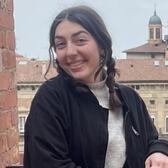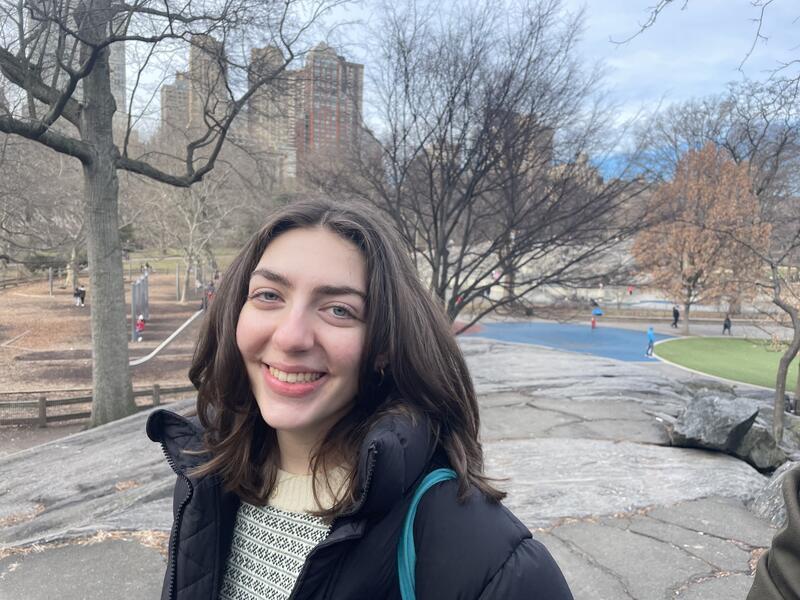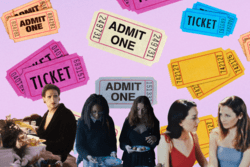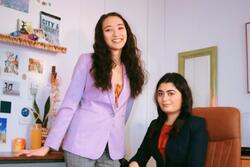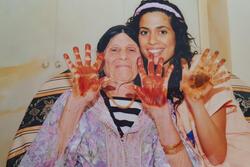Reflecting on My JWA Internship
Coming into my internship at the Jewish Women’s Archive, I felt like I knew relatively little about Judaism and Jewish women. I had taken Jewish studies classes in college and enjoyed them so much I decided to minor in the field, and growing up Jewish in New York City gave me plenty of cultural context, but I was still nervous about coming to JWA because I had doubts about my own Jewish identity.
I’m not a particularly religious person; I chose not to have a bat mitzvah, my observance of important holidays has tapered off over the years, and I haven’t been to a synagogue service since I was thirteen. Growing up with a Jewish father and a Lutheran mother (neither of my parents are religious either), I felt at different points of my life not Jewish enough. Growing up I was asked if I was really Jewish because my mother is not, even though I had a baby naming ceremony and underwent a formal conversion in a mikvah when I was one. Despite coming to college and learning more about different types of Jewry, the diversity of Jewish communities, and the varying levels of religiosity, I felt I didn’t know enough about Jewish women and more generally that I wasn’t Jewish enough to work at JWA.
Now, wrapping up my summer with JWA, my perception of my own Jewishness has shifted as I delved deeper into my work. My biggest task this summer was editing the Shalvi/Hyman Encyclopedia of Jewish Women—several profiles needed updating, so I researched and added significant information to their entries. Of course many of the people I learned about were white Ashkenazi Jews, like me, but I also learned about Sephardi and Mizrahi individuals, multiracial Jews, Jews of color, LGBTQ+ Jews, as well as Jews who converted later in life. And among all these women, there were many sects of Judaism represented in places across the globe. My research helped me see how widespread and multicultural the Jewish world is and can be.
One of the first profiles I worked on was Mizrahi Jew Loolwa Khazzoom, who was a pioneer in bringing Sephardi and Mizrahi Judaism into the conversation of mainstream American Judaism in the 1990s. In researching her accomplishments, I learned about Iraqi-Jewish culture. New York, being my home and a prominent location in Jewish-American media, was and still is my reference point for Jewishness. So, reading about Khazzoom, who grew up and is based on the West Coast, helped my perspective to shift. I learned about communities of Iraqi Jews in California; growing up, Khazzoom spoke Judeo-Arabic with her family and wasn’t allowed to lead prayers in her synagogue, as tradition dictated that girls sat in the back of the congregation, separate from the men, behind a mechitza. Her experience with Judaism was completely different from the New York Ashkenazi culture I grew up with.
I read about Delphine Horvilleur, a leader of the Liberal Jewish Movement in France and one of five female rabbis in the country. Unable to be ordained as a rabbi in France, she went to New York, where she was ordained in 2008. She is outspoken in the fight against French antisemitism, and even met with President Emmanuel Macron to discuss the issue. Even though I took French classes for years in school and I’m familiar with the basic shape of French history, I realized that I knew little about French Jewish history and contemporary life, aside from the Nazi occupation in the 1940s. I had always thought of Reform Judaism as uniquely American, but here was Rabbi Horvilleur co-leading the Reform movement in France! Although the Reform community in France is relatively small, I didn’t even know it existed until I worked on this piece.
I learned about Jewish women in Bollywood in the 1920s, and how they shaped the Hindi film industry. Bollywood does not stereotypically evoke Jewishness, and it was so fascinating to educate myself on a lesser known part of Jewish women’s history. I had no idea that these Baghdadi Jewish women were leading actresses of their time, much less running their own movie production houses and defining their field of work.
My internship with JWA this summer has truly opened my eyes to how expansive Judaism is, spanning across the globe and across religious movements. Even though I came in with an awareness of other Jewish communities outside of Ashkenazi Jews, I hadn’t learned about them extensively before. It was enriching to learn about such diversity within Judaism, which is something that I’ll continue to build on once my time at JWA is officially up. It showed me how there is space within Judaism for a multiplicity of traditions and identities, and it was inspiring to see how each of the people I researched actively worked to make Judaism more inclusive. After witnessing such diverse life experiences within Judaism, I feel more connected to my culture.
In seeing such a range of Jewish identities, this has only reiterated to me how flexible and individualized Judaism can be from person to person, leaving me more secure in my own level of Jewishness. There is not one way to be Jewish.

